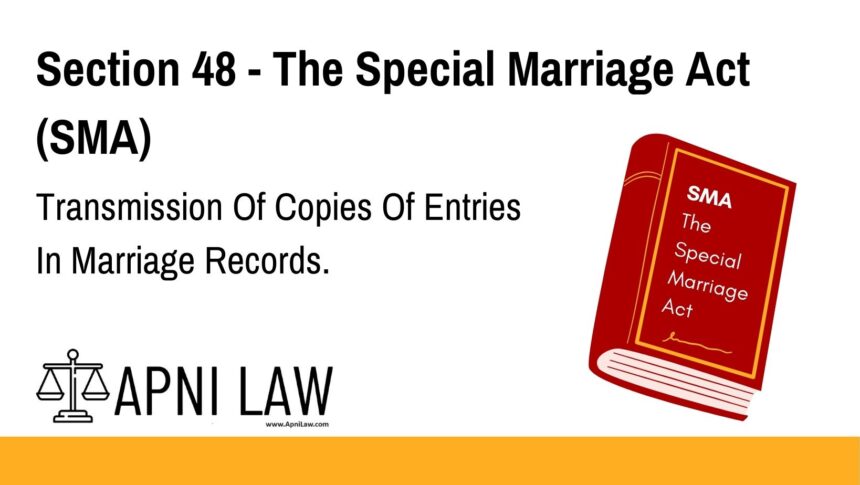Code: Section 48, Special Marriage Act, 1954
“Every Marriage Officer in a State shall send to Registrar-General of Births, Deaths and Marriages of that State at such intervals and in such form as may be prescribed, a true copy of all entries made by him in the Marriage Certificate Book since the last of such intervals, and, in the case of Marriage Officers outside the territories to which this Act extends, the true copy shall be sent to such authority as the Central Government may specify in this behalf.”
Explanation of Section 48 – Special Marriage Act
Section 48 mandates administrative transparency and record maintenance by requiring Marriage Officers to periodically send true copies of all marriage entries to the Registrar-General of Births, Deaths, and Marriages in their respective States. This provision ensures centralized maintenance of marriage records and supports uniform data collection across jurisdictions.
For Marriage Officers appointed outside India (in foreign territories where the Act is applicable), the true copies of entries must be sent to an authority specified by the Central Government, ensuring international coordination and proper documentation of Indian civil marriages abroad.
Key Provisions
- Applies to all Marriage Officers in Indian States and Union Territories.
- True copies of marriage entries must be transmitted:
- At prescribed intervals (as per rules made under the Act).
- In the prescribed format.
- In foreign jurisdictions, the transmission is made to an authority designated by the Central Government.
Illustration
Example 1: State-Level Record Keeping
A Marriage Officer in Maharashtra solemnizes and records multiple marriages under the Special Marriage Act. At the end of the month (as per prescribed rules), he compiles and sends a copy of all new entries from the Marriage Certificate Book to the Registrar-General of Births, Deaths and Marriages, Maharashtra.
Example 2: Overseas Marriages
An Indian embassy official authorized as a Marriage Officer in London solemnizes marriages under the Act. The records of these marriages are periodically sent to an authority specified by the Indian Central Government, ensuring legal recognition and documentation of overseas marriages.
Common Questions & Answers on Section 48 SMA
1. What is the purpose of sending copies to the Registrar-General?
It centralizes marriage data for official record-keeping and enables access for legal, statistical, and administrative purposes.
2. How often are these records sent?
The frequency (intervals) and format are defined in the rules made under the Special Marriage Act, which may vary by State.
3. Who receives the marriage records in foreign jurisdictions?
For marriages solemnized outside India, records are sent to an authority specified by the Central Government, typically a diplomatic or consular authority.
4. Does this ensure authenticity of marriage records?
Yes. By requiring regular submission of certified copies to a centralized registrar, the law helps prevent fraud and preserves the integrity of official records.
Conclusion
Section 48 of the Special Marriage Act is a procedural safeguard that reinforces the systematic documentation of civil marriages across India and abroad. It ensures that marriage records are not only properly maintained but also integrated into the broader national vital statistics system. This provision enhances transparency, legal credibility, and accessibility of marriage data.
For more legal resources and in-depth commentary on marriage law in India, visit ApniLaw.








